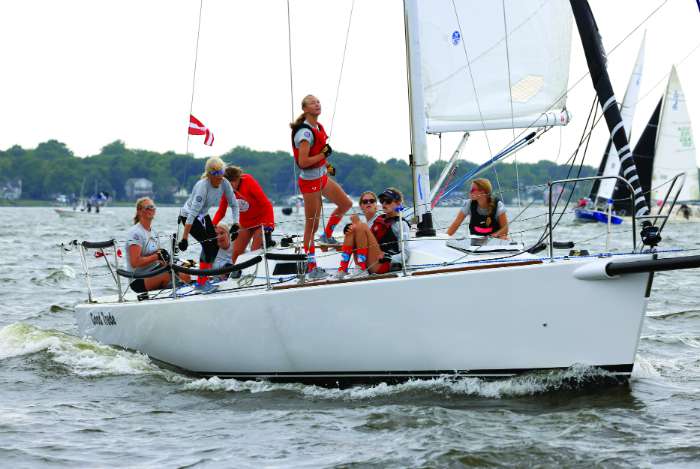Sailfaster: A Tactical Chess Game on Water With Annapolis Sailor Marie Klok Crump
Sailfaster recently featured two-time Danish match racing champion Marie Klok Crump about her journey into match racing, what it takes to succeed, and how match-racing’s tactical intensity sharpens skills for fleet racing. Hear the full episode on Apple Podcasts, Spotify, or watch it on YouTube.

How did your sailing journey begin, and what led you to match racing?
Marie: I was drawn to sailing early but took a long break before re-engaging in high school in Denmark. My dad helped develop match racing centers in Scandinavia, and I saw juniors laughing, having water fights, and enjoying the sport. That was my turning point. Within two years, I was ranked in match racing.
Many sailors think they need a rigid progression—dinghies, keelboats, Olympic pathways—but if you’re eager to learn, willing to put in the time, and open to new experiences, you can become proficient at any stage.
What was it about match racing that appealed to you?
Marie: What captivated me was its intensity and one-on-one nature. Unlike fleet racing, where external factors—wind shifts, current variations, and other boats— dictate your race, match racing is purely about out-manoeuvring one opponent. No hiding behind fortune; you either outthink and out-sail the other boat, or you don’t.
I vividly remember watching the 1992 Barcelona Olympics, one of the most well-broadcast sailing events. Seeing the precision and strategy in those head-to-head battles was a game-changer for me.
What does it take to excel in match racing?
Marie: It’s about decision-making under extreme time pressure. No margin for hesitation—you train for chaos, drilling not just tacks and gybes but also moments where everything is on the edge of unravelling. The best sailors aren’t just fast; they make fewer mistakes and recover instantly.
It’s also about tactical mastery. Unlike a fleet race where you can afford to think long-term, match racing is about winning every moment. The races are short, often 16–20 minutes, so every second counts.
Whether setting up for the perfect start, controlling a downwind gybing duel, or executing a flawless dial-down, anticipation and execution under pressure are everything.
How does match racing experience benefit fleet racing?
Marie: The skill set developed in match racing is invaluable in fleet racing, particularly in mark roundings, pre-start positioning, and defending lanes. Match racers thrive in boat-on-boat combat, using positioning and tactical aggression to control their race.
Boat handling is another key advantage. Fleet racers focus on macro strategy—wind patterns, course geometry—but match racing forces you to be instinctively dialed into the boat’s feel. The ability to execute a perfect tack or gybe in a split-second decision translates into better overall race performance.
How do you balance situational awareness with the need for immediate tactical decisions?
Marie: Match racing is a balance between micro and macro decision-making. The skipper is deeply engaged in the duel—fighting for control, executing a lee-bow tack, or protecting the favored side—while the tactician tracks shifts and risk versus reward. The crew must function as a unit, anticipating moves before they happen. It’s why match racing teams focus on fluid, instinctive communication. There’s no time for “ready about” calls; everyone must react instantly, whether adjusting tactics, making a last-second duck, or fighting for a crucial mark rounding.
If you had one piece of advice for sailors looking to sharpen their competitive edge, what would it be?
Marie: Sail every position on the boat. Understanding trimming, hoisting, dousing, and boat balance makes you a better skipper, tactician, or trimmer. It also strengthens teamwork, reducing inefficiencies. Beyond that, never stop learning. The best sailors absorb knowledge from every race, regatta, and debrief. Every experience adds to your knowledge base.
Find more sailboat racing articles




